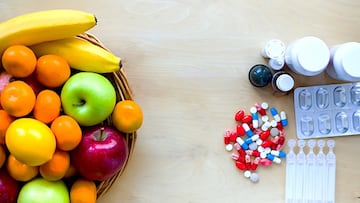Be careful what you eat if you take these medications
Caffeine, citrus fruits and tea, are just a few foods that interact with some medications and can be harmful to health. Here’s a look at which don’t mix.

When you take medications orally, the most common type, one of the main problems is the interaction with some foods, which gather in the stomach more than expected since it is normal that they are taken together.
Some foods can influence the effect of medicines taken by mouth. In the vast majority of cases, these effects are of minor importance and the efficacy of the treatment is not altered, but there are occasions when a food can cause the drug to perform its therapeutic function incorrectly.
Foods that cannot be mixed with medicines
- Grapefruit juice: contains flavonoids, which can affect how many drugs are metabolized in the digestive system, so it is advisable to avoid this juice during treatment with any type of medication, as it alters its effect.
- Salt: increases fluid retention and favors an increase in blood pressure. Its consumption, or that of foods rich in salt such as sausages, pickles, can affect diuretic drugs or for the treatment of hypertension. It decreases the effect of medications and can cause arrhythmias.
- Foods that modify the PH, which are acidifying and alkalizing: such as meat, poultry, bacon, cereals, plums, blueberries, nuts, eggs, corn, lentils, fish, shellfish and cheeses are foods that acidify the pH. Milk, fruits (except plums and blueberries), almonds, chestnuts, coconut, vegetables and legumes (except lentils) are alkaline foods; all can affect the absorption of the drug and modify intestinal transit.
- Milk and products rich in calcium: they can have a very important effect in treatments with some antibiotics, since they decrease their effect on the body.
- Foods rich in vitamin K: vegetables such as broccoli, cauliflower, Brussels sprouts, spinach or turnips, can have important effects on some anticoagulant drugs such as warfarin. Other products such as avocado or garlic (in large quantities) can also produce effects on anticoagulant medications. Foods rich in tyramine, such as fermented cheeses, pickled fish, smoked fish, red wine, chocolate or bananas, can cause rises in blood pressure in patients treated with some antidepressants. These decrease the effect of medications and enhances their anticoagulant effect.
- Alcohol, food supplements or herbs and medicinal plants: have a large number of interactions with medications of many different varieties. Alcohol has two aspects where it modifies the effect of medications, both increasing the effect of some and decreasing the effect of others. It can also cause toxic effects in some patients.
What you should always keep in mind is to talk to your doctor. If you take nutritional or food supplements, tell us about it, since it can affect the effect that the medication seeks.
If you are a regular consumer of coffee or tea with iron salts, you will see that they reduce the absorption of iron by forming insoluble and poorly absorbable complexes in the intestine.
The importance of caffeine
If you take caffeine with acetylsalicylic acid (aspirin, pain relievers) you will see that the rate of absorption and blood levels of aspirin increase.
If you take caffeine with antiofylline (an anti-asthma medicine), it increases the effect of theophylline and can cause poisoning. Grilled foods reduce the effect of this type of medication.
Related stories
If you consume caffeine with psychoactive drugs, such as benzodiazepines or lithium, it can antagonize the hypnotic and anxiolytic effect of these drugs, and reduce lithium levels, possibly producing a rebound effect in case of cessation of caffeine consumption in the body.
If you consume caffeine with phenylpropanolamine, which is a decongestant, the hypertensive effect of phenylpropanolamine may be potentiated, in addition to increasing plasmatic caffeine concentrations.
